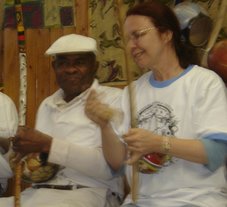By an incredible coincidence, I came across the following newspaper article in Correio da Bahia yesterday:
"Teachers and students seek to strengthen Capoeira Angola: Combination dance/fight was almost extinct in the 1980s"
By Adriana Jacob
The 25th anniversary of the beginning of the process of reaffirming Capoeira Angola in Bahia will be remembered through to this coming Tuesday (August 7th) by a group of students of masters Moraes, João Grande and Cobra Mansa. Gathered at the Nzinga Institute for Capoeira Angola Studies, the International Capoeira Angola Foundation (FICA) and the Zimba Capoeira Angola Group, teachers and students held classes, rodas and debates about the aim of strengthening and discussing the combination dance/fight and sport immortalised by names like Mestre Pastinha.
"We called the event Malungos, which means 'travelling companions', because the word invokes the journey and memory of a generation of Capoeiristas who have been active participants since the time that many researchers call the reaffirmation of Capoeira Angola in Bahia," says Paulo Barreto, or Mestre Poloca, from the Nzinga Group. He explains that in the early 80s, Capoeira Angola was considered virtually exinct. "Then a group started to mobilize itself through events that showed the world that the great masters of Angola were still alive, but forgotten," he relates.
Ever since, Angoleiros, set apart by their yellow and black uniforms - chosen by Mestre Pastinha in honour of Ipiranga, his beloved football club - have been gaining more and more ground. "Today, Capoeira Angola is found in Israel, China, Japan, Turkey, Mozambique, the United States.... It's estimated that in Brazil, 8 million people play Capoeira, but most practise the regional style created by Mestre Bimba."
"Capoeira Angola is a cooperative interplay and not a competition. It is a different kind of philosophy, but it can also be violent," observes Poloca. Created in honour of Queen Nzinga of Angola - who reigned for 40 years due to her skill in negotiating and making war on the slave trade - the group makes the struggle against gender discrimination one of its watchwords. On Tuesday and Thursday mornings, they hold women-only classes. "Capoeira has always been a predominantly masculine space, partly because of its past history of persecution and violence. This is a new achievement for women," says Paula Barreto, or Mestra Paulinha.
Monday, 6 August 2007
Subscribe to:
Post Comments (Atom)


No comments:
Post a Comment